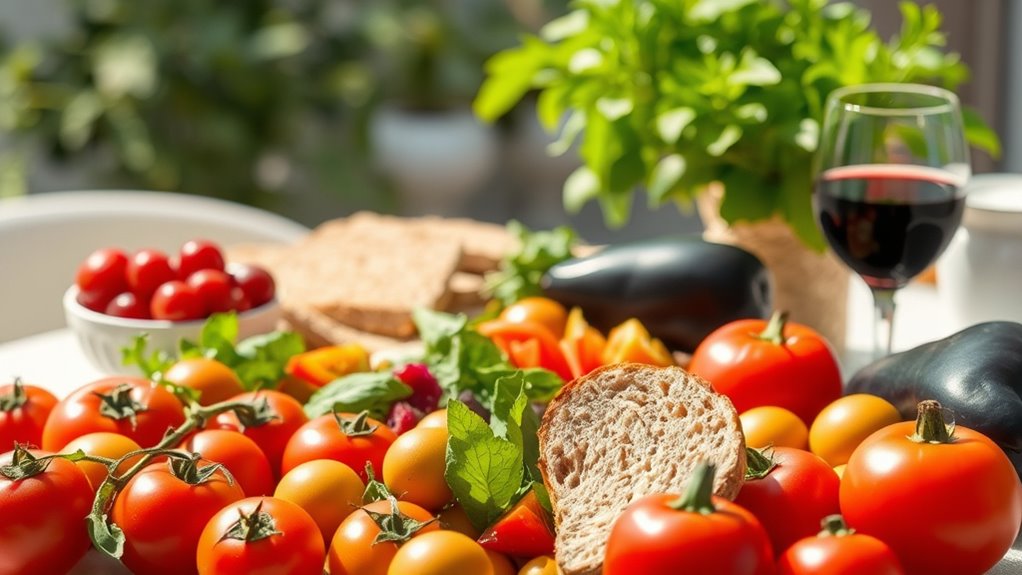To adapt the Mediterranean diet for aging adults, focus on emphasizing nutrient-rich foods like vegetables, fruits, whole grains, and lean proteins such as fish and beans. Use herbs and spices to reduce salt, incorporate heart-healthy olive oil, and choose lower-sodium cheeses. Adjust portion sizes and include more fiber to support digestion and overall health. Making these small changes can boost your well-being, and you’ll discover even more tips as you continue exploring ways to enjoy the diet safely and deliciously.
Key Takeaways
- Modify traditional recipes by reducing salt and using herbs to enhance flavor while supporting heart health.
- Incorporate more fruits, vegetables, whole grains, and lean proteins to meet aging adults’ nutritional needs.
- Use olive oil instead of butter or margarine to promote cardiovascular health and healthy aging.
- Adjust portion sizes and include nutrient-dense ingredients to support weight management and prevent chronic illnesses.
- Personalize meal plans with familiar flavors and enjoyable ingredients to encourage long-term adherence to the Mediterranean diet.

As you age, maintaining a healthy diet becomes essential for preserving liveliness and preventing chronic illnesses. The Mediterranean diet offers numerous nutritional benefits that support healthy aging, including heart health, improved brain function, and better weight management. To make the most of this diet, you might need to contemplate recipe modifications that suit your changing nutritional needs and taste preferences. For example, replacing high-sodium ingredients with herbs and spices can reduce salt intake while enhancing flavor. Incorporating more fruits, vegetables, and whole grains into your meals not only boosts fiber intake but also provides essential vitamins and antioxidants that combat oxidative stress and inflammation, common concerns as you get older. Adjusting portion sizes can also help you better manage calorie intake and support your health goals as you age.
Adjusting traditional Mediterranean recipes to better fit your health goals is straightforward. Use olive oil instead of butter or margarine for heart-healthy fats, and opt for leaner protein sources like fish, chicken, or plant-based options such as beans and lentils. You can also modify recipes to reduce added sugars by substituting natural sweeteners like honey or ripe fruits, ensuring your meals remain flavorful without unnecessary empty calories. These recipe modifications help you enjoy the Mediterranean cuisine you love while aligning with your nutritional needs as an aging adult.
As you explore Mediterranean dishes, focus on balancing nutrient-rich ingredients. For example, a classic Greek salad can be enhanced by adding more vegetables or swapping out feta for a lower-sodium cheese option. When preparing dishes like pasta or rice, choose whole-grain varieties to increase fiber intake, which supports digestion and maintains steady blood sugar levels. Incorporating a variety of nuts and seeds as toppings adds healthy fats and protein, further enriching your meals and promoting satiety. By customizing recipes, you can make the diet more enjoyable and sustainable, ensuring you stick with it long-term.
Frequently Asked Questions
How Does the Mediterranean Diet Specifically Benefit Cognitive Health in Seniors?
You’ll notice that the Mediterranean diet boosts your brain health and enhances memory by providing antioxidants, healthy fats, and anti-inflammatory foods. These nutrients protect your brain cells from oxidative stress and support neural connections. Eating plenty of fruits, vegetables, olive oil, and fish helps reduce cognitive decline risk, keeping your memory sharp longer. Incorporating this diet into your routine can make a meaningful difference in maintaining mental agility as you age.
Are There Any Age-Related Dietary Restrictions or Modifications for the Mediterranean Diet?
You should consider age-related dietary restrictions by practicing portion control to avoid overeating and managing calorie intake. Additionally, you might need to evaluate supplement considerations, especially if nutrient absorption decreases with age. Focus on nutrient-dense foods like vegetables, fruits, and healthy fats, and consult with your healthcare provider for personalized advice to guarantee your diet supports your changing nutritional needs effectively.
Can the Mediterranean Diet Help Manage Common Chronic Diseases in Aging Adults?
Yes, the Mediterranean Diet can help manage common chronic diseases in aging adults. It improves nutrient absorption by emphasizing nutrient-dense foods like fruits, vegetables, and healthy fats, which support overall health. Additionally, the diet’s varied food textures make meals enjoyable and easier to chew, especially for those with dental issues. This combination promotes better health outcomes, reduces inflammation, and supports disease management effectively.
What Are Practical Tips for Seniors to Adhere to the Mediterranean Diet Long-Term?
To stick with the Mediterranean diet long-term, focus on simple meal preparation that fits your routine. Plan ahead by shopping for fresh ingredients and prep meals in advance. Enjoy social dining by sharing meals with friends and family, making healthy eating more enjoyable. Don’t be discouraged by setbacks—gradually incorporate these habits, and you’ll find sticking with the diet becomes easier, supporting your health and well-being over time.
How Does the Mediterranean Diet Impact Medication Interactions for Older Adults?
You might wonder if the Mediterranean diet affects medication interactions. It generally supports better medication management by reducing inflammation and improving heart health, which can lessen adverse drug interactions. However, certain foods like grapefruit can interfere with specific drugs, so it’s essential to stay aware. Regularly consulting your healthcare provider helps ensure your diet complements your medications safely, minimizing risks and optimizing overall health.
Conclusion
By embracing the Mediterranean diet, you’re not just choosing healthier foods—you’re planting seeds for a vibrant, flourishing future. Imagine your life as a sunlit grove, where each nourishing meal helps you grow stronger and more resilient with every passing day. So, take the plunge today; your journey toward graceful aging is a beautiful voyage, and this diet is the compass guiding you toward vigor and joy in every season of life.









